Modules
The Institute of Materials Science offers the following modules:
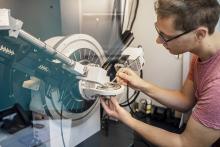
Advanced Electron Microscopy
content:
- design, realisation and evaluation of transmission electron microscopic experiments with atomic resolution
- basics of the electron-solid interaction as basis for the contrast formation and spectriscopy
- numerical simulation of the high-resolution transmission electron microscopy
- practical work with the TEM
duration: 1 Semester (V: 2 SWS | P: 2 SWS)
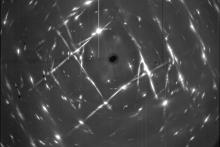
Analysis of the Real Structure of Matter
content:
- teaching of advanced methods of the real structure analysis consisting of X-ray diffraction and transmission electron microscopy
- discussion of paths to a useful combination of analytic methods for the investigation of different scientific problems in the field of materials science
- concept of the real structure of matter, especially crystal lattice defects, residual stresses and texture
duration: 1 Semester (V: 5 SWS | S: 1 SWS | P: 1 SWS)
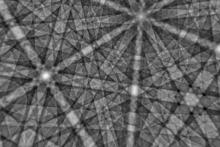
Analytische Verfahren der Elektronenbeugung im Rasterelektronenmikroskop
content:
- application and combination of analytic methods of electron diffraction in the scanning electron microscope
- methods for the interpretation and processing of measured data
- connection between crystal structure, Kikuchi diffraction images and crystal structure projections
- selected software for the treatment, evaluation and formatting of obtained data
duration: 1 Semester (V: 2 SWS)

Coatings Technology
content:
- basics regarding the deposition of thin and thick films on subtrates (physical and chemical deposition technologies)
- correlation between deposition technology, deposition conditions and thin film properties
- methods and principles of the characterisation of mechanical and physical properties of thin films
duration: 1 Semester (V: 3 SWS | P: 3 SWS)

Diagnosing short-lived transient States of Matter
content:
- properties of matter in extremely short-lived states of high pressure, density or temperature
- principles of extremely fast measurements of materials properties during short-lived states of matter
- interpretation of data from short-pulse laser measurements
- selection and design of measurement principles with respect to the scientific problem
duration: 1 Semester (V: 1 SWS | S: 1 SWS) -Blockkurs
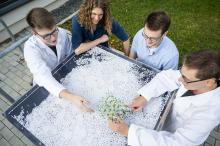
Eigenspannungen in Werkstoffen und Bauteilen
content:
- physical principles of the origin, mesurement and evaluation of residual stresses
- case-specific selection of methods for the measurement of residual stresses
- basics of elasticity theory
- methods of residual stress measurements, with a special focus on residual stress measurement based on X-ray diffraction
duration: 1 Semester (V: 1 SWS | S: 1 SWS | P: 1 SWS)

Funktionale Sondermetalle
content:
- basics of synthesis, characerisation and properties of non-ferrous metals
- derivation of fields of application from the relevant material properties
- microstructure formation as a consequence of the synthesis process and alloy composition
- refractory metals, noble metals and soldering materials within current material trends
duration: 1 Semester (V: 2 SWS)
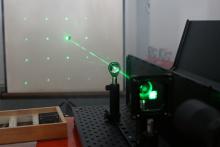
Grundlagen der Mikrostrukturanalytik
content:
- basics of crystallography and rules for the crystalline state of matter (symmetry and space groups)
- classification and interpretation of microstructure based on optical microscopy
- basics of the relation between crystal structure and crystal properties (crystal physics)
- principles of analytical methods and their application for the analysis of the crystalline solid state
duration: 1 Semester (V: 4 SWS | P: 1 SWS)
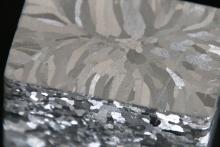
Grundlagen der Werkstoffwissenschaft
content:
- basic structural and mechanical properties of materials
- correlation between microstructure formation and phase diagrams
- linking of synthesis process, microstructure and properties of materials
- determination and evaluation of mechanical, structural, physical and chemical properties of materials
duration: 2 Semester (V: 3 SWS | S: 1 SWS [part I]; V: 3 SWS | S: 2 SWS | P: 2 SWS [part II])

Heterogene Gleichgewichte und Phasenumwandlungen
content:
- influence of thermodynamical variables on phase transitions and their kinetics
- analysis of heterogeneous phase equilibria using thermochemical methods
- mechanisms of phase transitions and heterogeneous reactions
- interplay of thermodynamics and microstructure for soem relevant materials
duration: 1 Semester (V: 3 SWS | S: 1 SWS)

Introduction to Atomic and Solid State Physics
content:
- relations between crystal structure and electronic structure of solid states of matter
- particle-wave dualism and Schrödinger equation
- derivation of electric, magnetic, optical and thermal properties of solids
duration: 2 Semester (V: 3 SWS [part I]; V: 3 SWS [part II])

Modern X-ray Optics
content:
- working principles and fabrication methods of important X-ray optic components
- application and experiment-sensitive selection of X-ray optical components
- interaction of the X-ray beam with matter as principle physical process for the shaping of the X-ray beam
duration: 1 Semester (V: 1 SWS | P: 1 SWS) -block course

Nichteisenmetalle
content:
- overview of technologically relevant non-ferrous metals and their alloys
- application-dependent material selection according to the properties of non-ferrous metals
- synthesis, microstructure formation and application for construction design
- aluminum, titanium, magnesium, nickel and copper
duration: 1 Semester (2 SWS)
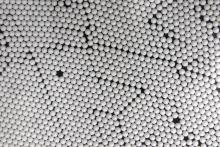
Physikalische Materialkunde
content:
- basics of mechanical properties of solids
- dislocation theory, and corelation of microstructure and machenical properties
- diffusion and creep
- processes of plastic deformation on a microscopic scale
- martensitic transformations
duration: 2 Semester (V: 4 SWS | S: 2 SWS [part I]; V: 4 SWS | P: 1 SWS [part II])

Practical Aspect of Thermodynamic Analysis
content:
- experimental methods and principles of the construction of phase diagrams
- thermodynamic modelling of phase diagrams
- methods of thermal analysis: DTA and DSC
- development of ceramic materials based on experimentally determined and calculated phase diagrams
duration: 1 Semester (V: 2 SWS)

Spezielle Methoden der Mikrostrukturanalytik
content:
- overview of special methods to solve complex problems in materials science
- application conditions and sample preparation
- tomography, and methods sensing electrons, methods with accellerated ions and principles detecting electromagnetic radiation
duration: 1 Semester (V: 2 SWS)

Structure & Microstructure Analysis
content:
- analytical X-ray methods in the frame of the kinematical scattering theory (qualitative & quantitative phase analysis, determination of lattice parameters, measurement of residual stresses, texture analysis, determination of crystallite size and microstrain)
- electron-microscopic principles (transmission electron microscope)
- basics of electon probe microanalysis and scanning electron microscopy
- practical courses in X-ray diffraction and electron probe microanalysis
duration: 1 Semester (V: 5 SWS | S: 1 SWS | P: 2 SWS)

Werkstoffchemie
content:
- thermodynamic modelling of metallic and ceramic phases
- effect of thermodynamics and kinetics on phase transitions
- discussion of important aspects of thermochemistry and analysis of heterogeneous phase equilibria
- application of databases for the calculation of phase equilibria
- mechanisms of phase transitions
duration: 1 Semester (V: 4 SWS | S: 1 SWS | P: 1 SWS)

Werkstoffe für biomedizinische Anwendungen
content:
- synthesis, properties and applications of biocompatible materials
- interaction between materials and biological systems
- basics of biochemical interaction between tissue and materials
- principles of tailored selection of biocompatible materials
duration: 1 Semester (V: 2 SWS)

Werkstoffe für die additive Fertigung
content:
- overview of the processing of metallic materials through beam melting
- discussion of the interplay between microstructure, synthesis process and materials properties
- process technologies and their fields of application
- mechanical properties of materials and structure-property relations
duration: 1 Semester (V: 2 SWS)

Werkstoffe unter extremen Bedingungen
content:
- emergence and generation of extreme conditions (high and low temperature, pressure, irradiation)
- changes in the microstructure and physical properties at these conditions
- synthesis of special materials through extreme conditions
- design and application of materials under extreme conditions
duration: 1 Semester (V: 2 SWS)